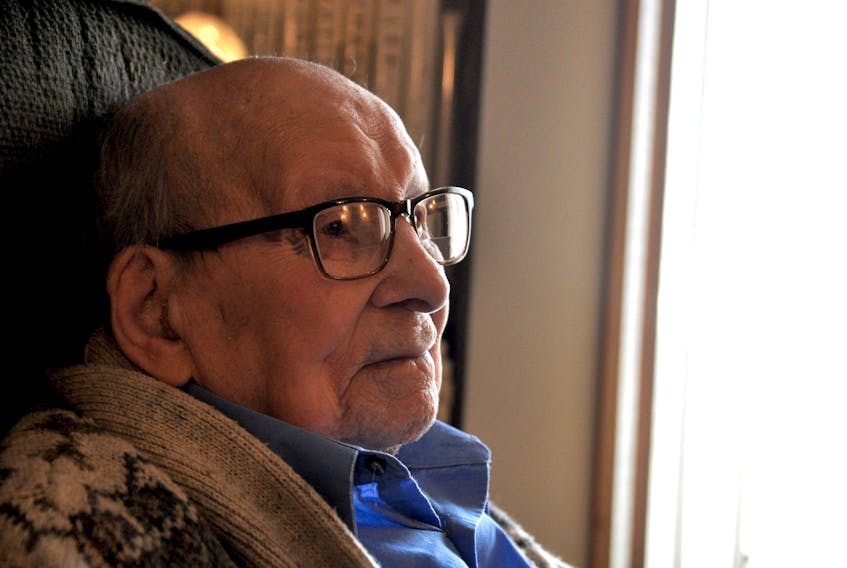NEW MINAS, N.S. — A life-saving operation nearly killed Hormidas Fredette when he was a prisoner of war.
He was given a vaccination that poisoned others, but told it was fine. Within hours, he had a high fever and discoloured arm. Fellow prisoners and American doctors were instructed to remove a section of infected tissue without anesthetic or pain meds.
Fredette made it through, feeling glad he escaped the loss of his arm. But the Americans later revealed the procedure would have cost him his life.
“They took me aside to tell me they were certain I’d have died had they been forced to amputate. That shocked me – I’m glad they told me much later,” he says.
NEW BEGINNINGS
The 101-year-old Second World War veteran remembers enlisting in the militia as war broke out. He felt compelled not by a need to save his country, but by the need for a job, as prospects were dismal in depression-era Quebec.

Before leaving his hometown of Richmond, Fredette joined the militia, where he rose to the rank of corporal. He received a piece of paper from the government proving his rank to show the Army if he decided to join active duty, but he decided to not display it during his interview.
“I made a huge mistake. I thought, ‘I’ll start at the bottom and work up.’ But I never got a promotion, all the time I was fighting,” he laughs.
Fredette trained with other soldiers in Sussex, N.B., where he impressed his officers when he shot with 82 per cent accuracy on the shooting range – a score that got him kicked out of shooting practice.
“They thought, ‘that’s so wonderful – he’s learning so fast,’” he says with a laugh. “But then they kicked me out so others could practice.”
Fredette was then posted and stationed in St. John’s, N.L., where he met his now-wife, Lillian. After a few months of going steady, he proposed and she accepted.
And then she waited four years for him to return.
FIRST IMPRESSIONS OF WAR
Fredette’s regiment was deployed to serve at the Battle of Hong Kong, where British soldiers and Canadian soldiers defended the then British Crown Colony from the Japanese army.
Fredette’s regiment was stationed at the island’s Grand Repulse Bay Hotel, where they set up a defensive position and planned attacks from while working with few supplies and munitions.
It was a meager supply at best.
“Then suddenly there was no way to be able to get anymore. No ship could get to our camp, because they would have been sunk,” he said. “We had nothing at all.”
Fredette says these experiences made him realize he had no notions of what the war would look like when it broke out.
When he and his younger brother were at a movie in Richmond, they watched explosives rip up and pitch sod across the screen. He says he felt sure it was exaggerated, and told his brother so.
But he says he found this was a fairly accurate depiction the first time he saw a shell hit its target 15 feet in front of him.
“It was exactly like the movie. I never forgot telling him that, you know – it brought me right back to watching that movie with him,” he says.
AMBUSH AND LACKING SUPPLIES
No one was prepared when the island was ambushed by Japanese forces in December 1941.
Fredette was often sent out as a scout while marching with his regiment. On any given march, dozens were hit by bullets.
He recalls walking, once, and seeing sparks near his feet. These were from bullets aimed at him that had missed and ricocheted off the asphalt.
His scouting duties brought him to one of the island’s highest peaks as its night scout. He was alone and given no direction on who his officer was, how to defend against intruders, or how long he was to remain there.
He describes it as one of the longest nights of his life.

“I could not see my hand in front of my face. I sat with my gun on my forearm all night and felt like I barely moved until an officer came to get me,” he says.
Despite these scouting missions, Fredette liked his commanding officer and was shocked when he announced his departure following an argument with regimental leadership.
He walked out of the hotel and was never seen alive again.
“It was very bad judgment. The road was full of fur trees, and Japanese soldiers hiding in them. When we found him, he had 32 stab wounds. I’m still so sorry that happened to him,” he says.
The Japanese ambush quickly overtook the island, and it was eventually surrendered. Even after the surrender, many doctors and nurses were murdered.
On Christmas Day of 1941, Fredette became a prisoner of war.
PRISONER OF WAR
Three ladles of rice per day accounted for Fredette’s entire food allotment during his three years of imprisonment.
The rice often contained maggots, distinguishable from actual grains of rice only by their coloured heads.
“The best thing was to close your eyes and eat. But many would eat it and throw it up,” says Fredette.
Many of Fredette’s fellow prisoners of war died from starvation. He weighed around 170 pounds when he was first captured, and left weighing 110. He says he fared better than most.
“There’s a photo of us from the camp, and the line of men in it is just like skeletons. They don’t show those photos in history – not as much as I would like to see,” he says.
The prisoners survived on 800 calories per day but were still put to work in mines, on ships and working on trains. When he refused to work unless he was given more food, Fredette was severely beaten, sent to wash his wounds, and beaten again.
“That’s the worst I got. But there was always worse – I always felt so sorry for them,” he says.
After his arm infection, Fredette was removed from work duty. He remained inside, resting, and says he was alarmed when he heard strange sounds coming from outside his hut.
News of the camp conditions had spread and American planes dropped drums filled with supplies to the prisoners, nearly injuring them in the process.
“Forty-five-gallon drums were dropped and would almost hit people. Some even landed on buildings. We had to make a sign telling them to stop dropping them like that,” the veteran recalls with a chuckle.
RETURNING FROM WAR
Fredette survived and returned to his love in one piece - physically.
They married and moved back to Richmond to live with Fredette’s parents until he was hired by the Canadian National Railway, where he worked to identify faulty train cars. He later worked at the town’s pulp and paper mill and eventually moved to New Minas after receiving his pension.

Fredette says he was relatively unbothered by his memories, but he did experience some post-traumatic stress disorder (PTSD), something his children lived with and considered a normal part of life.
He now lives with his son, Brian, who says his father still sometimes yells in his sleep.
“We never thought about it when we were kids. I used his old Army cap to play with, and we’d hear him yelling at night, thinking, ‘Dad is yelling in his sleep again.’ It seemed normal,” he says.
Fredette says opening up and sharing his experiences happened gradually, despite not feeling direct trauma from the war during his waking hours.
His physical trauma was also limited, with his one arm remaining rigid after the war until regular exercise loosened the muscles.
Turning 102 this month, Fredette feels grateful for the gift of a life left largely untouched by horrors he endured.
He’s had a few recent health scares but remains healthy for his age, and talks about his experience often.
Brian brings out magazines and books he’s kept with pictures of his father in Hong Kong and as a prisoner of war, and points out his father’s trademark ears that make him distinguishable in most photos.
The scenes in the photos seem a lifetime away but the experiences still remain as clear as crystal to Fredette, seven decades later.
“I’m an open book. It’s hard to renew those memories of that hard time in my mind, but I don’t hide anything now,” he says. “I tell it exactly how it was.”









